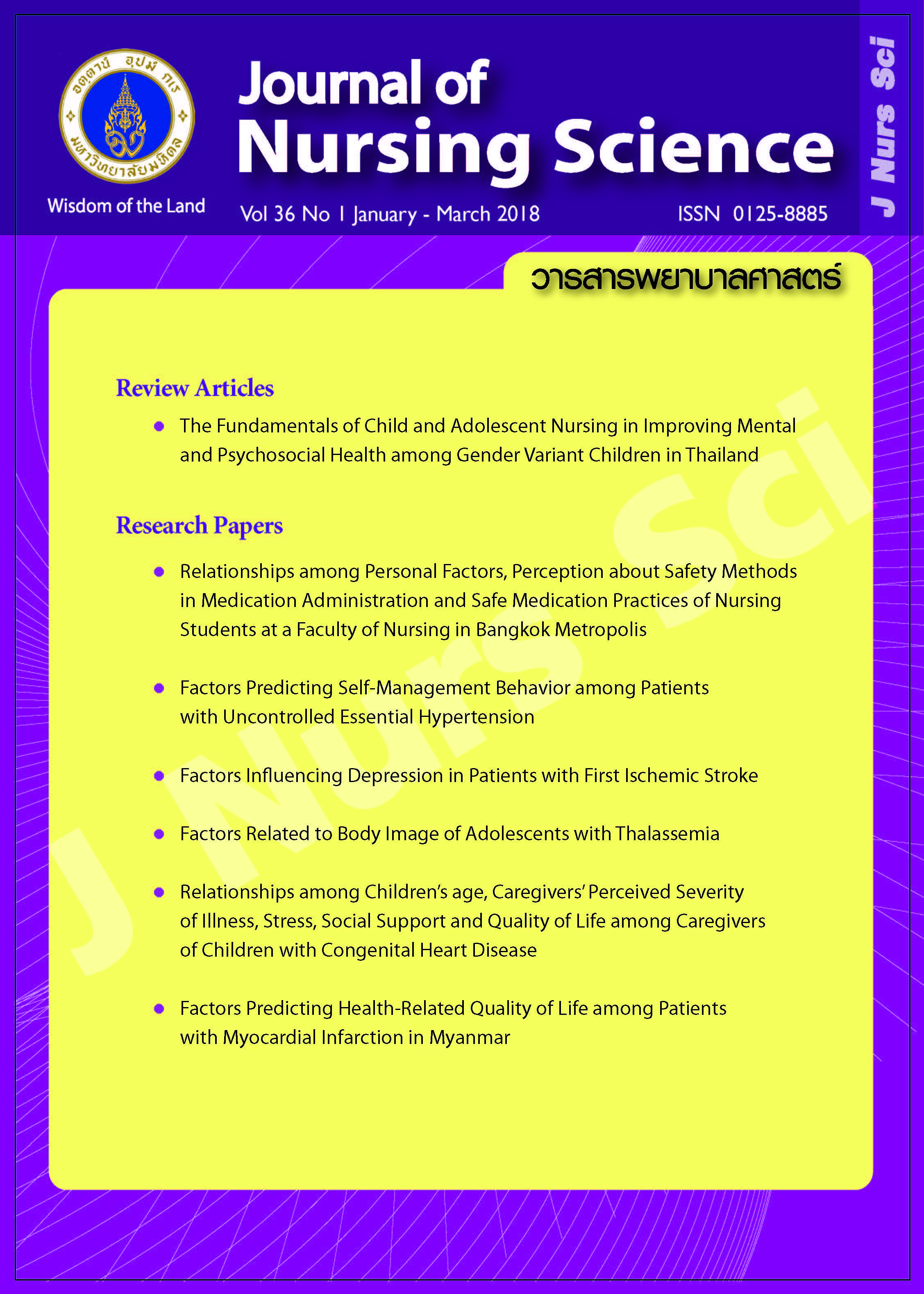Relationships among Children’s age, Caregivers’ Perceived Severity of Illness, Stress, Social Support and Quality of Life among Caregivers of Children with Congenital Heart Disease
Main Article Content
Abstract
Purpose: To examine relationships between age of patients, severity of illness, stress, social support and quality of life among caregivers of children with congenital heart disease.
Design: Correlational descriptive design.
Methods: The study sample included 85 caregivers of children with congenital heart disease aged birth to 15 years attending at the Heart/Cardiovascular Center, Chiangrai Prachanukroh Hospital. The sample was selected by convenience sampling. Questionnaires were used in collecting data including 1) demographic data questionnaire 2) perception of severity of illness questionnaire 3) stress questionnaire 4) social support questionnaire and 5) quality of life questionnaire. Data were analyzed using descriptive statistics and Spearman’s rank-order correlation.
Main findings: The study findings revealed that age of patients and severity of illness were not correlated with quality of life among caregivers of children with congenital heart disease (rs = .030, p = .39, and rs = - .127, p = .12, respectively). Stress was negatively and moderately correlated with quality of life among these caregivers (rs = - .574, p < .01). Social support was positively and moderately correlated with quality of life among these caregivers (rs = .603, p < .01).
Conclusion and recommendations: According to the study findings, quality of life among
caregivers of children with congenital heart disease was at a moderate level which was correlated with stress and social support. Therefore, healthcare team, especially professional nurses should assist these caregivers to reduce their stress and provide social support in all aspects in order to improve their quality of life.
Article Details
Copyright Notice: Nursing Science Journal of Thailand has exclusive rights to publish and distribute the manuscript and all contents therein. Without the journal’s permission, the dissemination of the manuscript in another journal or online, and the reproduction of the manuscript for non-educational purpose are prohibited.

Disclaimer: The opinion expressed and figures provided in this journal, NSJT, are the sole responsibility of the authors. The editorial board bears no responsibility in this regard.
References
Lerthamtewe W, Preungvate O, Sangperm P, Payakkaraung S, editors. Nursing textbook for children. 2nd ed. Bangkok: Pre-one; 2015. p.809-924. (in Thai).
2. Information center, Chiangrai Prachanukroh Hospital. Pediatric patients with heart disease [statistic]. Chiang Rai: Chiangrai Prachanukroh Hospital; 2014.
3. World Health Organization. Division of health promotion, education and communication health education and
health promotion unit. Health promotion glossary. Geneva: World Health Organization; 1996.
4. Srichantaranit A, Chontawan R. Caring for infants with congenital heart disease prior to cardiac surgery: the impacts on families. Journal of Nursing Science. 2011;29 Suppl 2:7-18. (in Thai).
5. Weerakul R.The relationship between perception of disease, social support and maternal behavior in caring for
thalassemic children [master’s thesis]. Bangkok: Mahidol University; 1996. 121 p. (in Thai).
6. Charatcharungkiat N, Wacharasindhu A. Quality of life among caregivers of children with autistic spectrum disorders and associated factors. Journal of the Psychiatric Association of Thailand. 2013;58(3):233-44. (in Thai).
7. Lawoko S, Soares JJF. Social support among parents of children with congenital heart disease, parents of children with other diseases and parents of healthy children. Scand J Occup Ther. 2003;10(1):177-87.
8. Al-Akhour N, Khader YS. Having a child with asthma – Quality of life for Jordanian parents. Int J Nurs Pract. 2009;15(6):574-9.
9. Uzark K, Jones K. Parenting stress and children with heart disease. J Pediatr Health Care. 2003;17(4):163-8.
10. Reichengerg K, Broberg AG. The peadiatric asthma caregiver’s quality of life questionnaire in Swedish parents.
Acta Paediatr. 2001;90(1):45-50.
11. Cohen J. Statistical power analysis for the behavioral sciences. 2nd ed. Hillsdale, New Jersey: Lawrence Erlbaum Associates; 1988. p.343-5.
12. Yotwongratsamee R. Factor influencing uncertainty in illness of parents with children admitted in intensive care unit
[master’s thesis]. Bangkok: Mahidol University; 2006. 83 p. (in Thai).
13. Gaiyawan Y. Business research. Bangkok: Soonsueserm Krungthep; 2005
14. Ponkaew W, Sanasuttipun W. Factors predicting adaptive behaviors in siblings of children with cancer. Journal of Nursing Science. 2016;31(2):71-81. (in Thai).
15. Mahatnirunkul S, Tuntipiwattanasakul V, Pumpaisalchai W, Pornmanajirangkul R. Comparison of the WHOQOL-100 and the WHOQOL-BREF (26items). Journal of Mental Health of Thailand. 1998;5(3):4-15. (in Thai).
16. Feeley CA, Turner-Henson A, Christian BJ, Avis KT, Heaton K, Lozano D, et al. Sleep quality, stress, caregiver burden, and quality of life in maternal caregivers of young children with bronchopulmonary dysplasia. J Pediatr Nurs. 2014;29(1):29-38.
17. Salvador A, Crespo C, Martins AR, Santos S, Canavarro MC. Parents’perceptions about their child’s illness in pediatric cancer: links with caregiving burden and quality of life. J Child Fam Stud. 2015;24(1):1129-40.
18. Crespo C, Carona C, Silva N, Canavarro MC, Dattilio F. Understanding the quality of life for parents and their children who have asthma: family resources and challenges. Contemp Fam Ther. 2011;33(2):179-96.
19. Pruthi GK, Mohta A. Psychosocial burden and quality of life in parents of children with anorectal malformation. J Indian Assoc Pediatr Surg. 2010;15(1):15-8.
20. Amakali K, Small LF. The plight of parents/caregivers of children with heart disease in the rural areas of Namibia: a problem of coping. Glob J Health Sci. 2013;5(2)62-73.
21. Yilmaz H, Erkin G, Ali A. Quality of life in mothers of children with cerebral palsy [Internet]. 2013 [cited 2017 Jan 25].
Available from: http://dx.doi.org/10.1155/2013/914738.
22. Yildiz A, Celebioglu A, Olgun H. Distress levels in Turkish parents of children with congenital heart disease. Aust J Adv Nurs. 2005;26(3):39-46.
23. Rezende LK, Comano FA, Carvalho SG, Chaves SP, Barca LF, Machado WCA, et al. Functional performance in children with down syndrome: correlations between social support and the quality of life of caregivers. Archieves of Current Research International. 2016;4(2):1-11.


